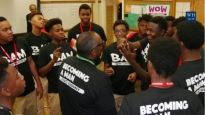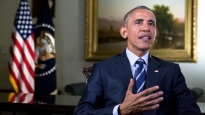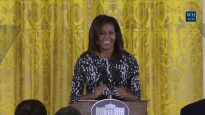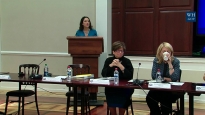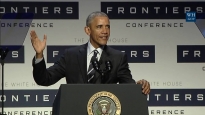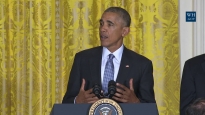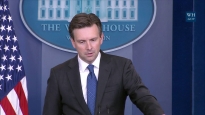Press Briefing 6/26/09
June 26, 2009 | 36:30
White House Press Briefings are conducted most weekdays from the James S. Brady Press Briefing Room in the West Wing. (public domain)
Download mp3 (33.6MB)
Briefing by White House Press Secretary Robert Gibbs, 6-26-09
THE WHITE HOUSE
Office of the Press Secretary
_________________________________________________________________________
For Immediate Release June 26, 2009
PRESS BRIEFING
BY
PRESS SECRETARY ROBERT GIBBS
James S. Brady Press Briefing Room
Office of the Press Secretary
_________________________________________________________________________
For Immediate Release June 26, 2009
PRESS BRIEFING
BY
PRESS SECRETARY ROBERT GIBBS
James S. Brady Press Briefing Room
2:13 P.M. EDT
MR. GIBBS: Let me just quickly do the week ahead. The President will spend the weekend in Washington and has no scheduled public events.
On Monday the President will meet with President Uribe of Colombia here at the White House. He will attend an event at the White House recognizing and celebrating the accomplishments of LGBT Americans. Invited guests include families, volunteers, activists, and community leaders.
Tuesday the President will hold an event here at the White House. Wednesday the President will attend meetings --
Q What kind of event?
MR. GIBBS: Unclear. On Wednesday the President will attend meetings at the White House and an event in the D.C. area.
Q Cryptic.
MR. GIBBS: Very good, right? We're expanding the circle. (Laughter.)
On Thursday the President will attend meetings at the White House. Later the President will travel to Camp David, where he will remain until Saturday. On Saturday the President will return to the White House and host a 4th of July event here in the evening. And as you all know, on Sunday night the President will depart for Moscow.
Q Any statements from --
MR. GIBBS: Not that I'm aware of.
Q Do you know when the press charter is leaving? Because the last we heard was either the 4th or the 5th.
Q Saturday.
Q Late, late in the day.
MR. GIBBS: Yikes. Mr. Feller.
Q Thanks, Robert. A quick follow-up on Iran, out of today's press avail. The President said there was no doubt that any direct dialogue or diplomacy with Iran is going to be affected by the events of the last several weeks. And I just wanted to see if you could add a bit to that, what he means by "no doubt"? What has definitely changed at this point and what still remains to be seen?
MR. GIBBS: Well, Ben, I think you heard the President say in his news conference earlier in the week that right now our focus is on what's going on there on the ground. Obviously lots has to -- a lot of things are going to have to shake out and get figured out obviously as we watch that. I think the President has been clear on that. As I've mentioned here, there are multilateral invitations.
And, look, a lot of this is -- the Iranians have been offered a pathway to meet their responsibilities. In many ways, their actions are up to them and I think that's what the President said today. The G8 last night reiterated their multilateral invitation through a statement -- based on an ongoing invitation from early April.
Q Well, I understand he's been consistent saying that events have to play out and the U.S. is watching and the world is watching. But when he says today there's no doubt that any direct dialogue is going to be affected by what's happened, is it clear at this point, regardless of what happens in the coming days, that at least something has changed?
MR. GIBBS: Well, I mean, look, I think we've seen the images, we've seen the violence, we've seen the actions in a way that leads I think many to believe that Iran isn't going to choose the pathway that's been offered by this and other countries as part of the P5-plus-1. Obviously it's -- again, I think their actions are up to them.
Q I also wanted to ask quickly on climate. The House had a test vote this morning and the climate bill narrowly got through there. Is the White House as confident today as you were yesterday that this bill will ultimately pass?
MR. GIBBS: Well, you know, the President obviously has been engaged in talking to members, as have staff members here. I think you heard the President discuss the importance of this legislation when he did -- when he met with you all with Chancellor Merkel. And we continue to work it hard in hopes that today will make a big step forward in getting climate change and energy independence legislation one step closer to his desk.
Q Is he still confident?
MR. GIBBS: Yes.
Yes, sir.
Q Just sort of a variation on the Iran question. When the President said there was no doubt, did that mean that, in effect, he's decided to delay his outreach for now? Or is he just sort of stating the obvious that the talks -- that the outreach can't proceed until the situation is --
MR. GIBBS: I think it's more stating the obvious of -- and again, reiterating what he said earlier in the week, that obviously the Iranian regime is involved in what's going on inside of Iran right now. But again, I think, as I stated earlier, there are multilateral invitations. And again I want to reiterate most of all that there are decisions relating to what's going on currently in Iran and ways for them to meet their responsibilities as it relates to nuclear weapons or terrorism that are, in many ways, decisions that they have to make. And it's up to them to accept the pathway to responsibility.
Q And I also wanted to ask a question about the meeting with President Uribe. Colombia is very interested in getting the free trade agreement approved that's been pending for a long time. Are you expecting any sort of concrete results to come out of this meeting that would advance that agreement?
MR. GIBBS: I won't get ahead of what the President will talk about -- or what might come out of the meeting, I should say. But I have no doubt that it will be something that President Obama and President Uribe discuss early next week.
Yes, sir.
Q Senator Grassley has said that the administration is stonewalling on these trade agreements. Is that a fair way to characterize it?
MR. GIBBS: I don't think that's the case. And I don't honestly know the basis for which he makes that statement.
Yes, sir.
Q Greenpeace announced yesterday that it opposes the energy legislation. And I know that President Obama wanted -- or originally proposed a hundred percent auction, and it's now down to 15 percent. Greenpeace says that the lobbyists have gotten to this bill and watered it down so much that it's better not to pass it. I'm wondering if President Obama feels that this is the best bill that can pass Congress, or if he stands by the content of this bill regardless of the political realities?
MR. GIBBS: Look, I think there's no doubt that the President believes this would be a historic step forward in energy and climate change legislation; that he disagrees with those on both sides of the political spectrum that criticize this legislation.
Jake, I won't -- I believe the President would very clearly say that would a process of a hundred percent auction that he proposed in the campaign be a more perfect way to do it? Yes. But I think the administration is not going to make the perfect the enemy of the really, really good. In a way that moves this bill -- it moves this legislation forward and gets us one step closer to taking comprehensive action to deal with dangerous greenhouse gas emissions that we all know threaten and endanger our planet. And I think that's why he's working hard right now to ensure that it's one step closer today.
Q Okay, I will ask. The President has talked a lot about his love of music. He hosted Stevie Wonder here. He has talked a great deal about what's on his iPod to Rolling Stone Magazine. Well, what's his reaction to the death of Michael Jackson?
MR. GIBBS: I talked to him about it this morning. Look, he said to me that obviously, Michael Jackson was a spectacular performer, a music icon. I think everybody remembers hearing his songs, watching him moonwalk on television during Motown's 25th anniversary. But the President also said, look, he had -- aspects of his life were sad and tragic. And his condolences went out to the Jackson family and to fans that mourned his loss.
Q Why not a written statement, then?
MR. GIBBS: Because I just said it.
Q And you say he did send condolences to the family -- did he call the family personally?
MR. GIBBS: Not that I know of.
Q That was going to be my question, but you answered it --
MR. GIBBS: We're done, right? (Laughter.) You guys really didn't have a bunch of climate change questions either. I noticed you guys were a bit shy when the President was standing up there earlier today.
Q We were shocked.
Q Should we have shouted?
Q Was he waiting --
MR. GIBBS: I could have arranged it through a third party.
Q Ooooh! (Laughter.)
MR. GIBBS: Sorry, go ahead.
Q I did think about shouting, but I already did that once this week.
The administration has consistently said that you have not wanted to meddle in the Iranian elections. But in the President's remarks today, when speaking about the opposition leader Mousavi, he said "he has captured the spirit and imagination of the Iranian people." Isn't that an endorsement?
MR. GIBBS: No. You know, look --
Q It sounds like a strong endorsement.
MR. GIBBS: I think this was in a question about defending a statement that some of you all had been critical of, in terms of not endorsing him earlier.
Look, the President, as he said today, has taken great pains not to interject himself or the United States into this back-and-forth. I think we all understand -- and we've seen the actions of President Ahmadinejad in just the last few days, trying very desperately to interject somebody else into this equation while people continue to make their voices heard and condemn the violent actions of the government.
I think -- again, I've said this a lot over the past few days, and almost two weeks, but that's what some in Iran want this administration and this country to do. And the President has spoken out about the universal principles that are involved here, while not getting involved in a debate in Iran, among Iranians.
Yes, ma'am.
Q President Carter was in Gaza recently and said that the people there are treated like animals. Does the President agree with that?
MR. GIBBS: I have not seen President Carter's statement on that. I think the President believes clearly that comprehensive peace can bring security, stability, and opportunity to all people in the Middle East. I think the President has spoken about ensuring that hope and opportunity for Palestinians if both sides will have the courage to come together and seek that long-term peace.
Q I have a follow-up. The President always speaks about the right of the Israelis to exist, but he doesn't speak about Palestinians, who 7 percent of their land is under occupation. Do they have a right to exist?
MR. GIBBS: Absolutely, Helen. I think if you look back at the --
Q Under occupation? How many years --
MR. GIBBS: Well, look, let me not parse the President's words. I think if you look through the speech in Cairo, I think the President is pretty clear in his support for comprehensive peace, as I said, a two-state solution that will bring stability, security, and opportunity to everyone in that troubled region of the world.
Q Well, my only follow-up is that in his public remarks, he only speaks of Israel's rights.
MR. GIBBS: No, I -- we'll pull that Cairo speech and we can have a conversation about different aspects of it. I think if you take a look at that again you'll see that the President is --
Q I'm talking about other times that he talked.
MR. GIBBS: Well, does that time not count?
Q How long does he go on that he never speaks of Palestinians?
MR. GIBBS: I think you can go back and look at his comments, and he's been very clear on this.
Chip.
Q Ever since the President toughened his language a few days ago, two things have happened -- maybe more than two, but at least two. One is that the dissent has been all but crushed. So is he powerless to affect the situation there? And second, Ahmadinejad has attempted to use his words as exactly the kind of foil and political football that the President wanted to avoid. So, number one, is the President powerless there; and number two, did he give them the kind of ammunition that he was trying to avoid giving?
MR. GIBBS: No. Interesting 180 on your earlier question from earlier in the week.
Q Times change.
MR. GIBBS: Yes, apparently. Look, I think the international community continues to condemn what is going on in Iran. I think if you asked the Iranian regime where they are right now and where they sit and whether they think they're in good stead and in control of that country, I think you'll in a moment of honesty get a far different answer. The President, again, has responded forcefully from the very moment of the elections, the first day that you all asked him questions in the Oval Office about violence that might happen and violence that at that point had already happened.
I think, again, what you've seen from Ahmadinejad is probably right out of the regime's playbook. They were going to -- in many ways, they were going to try to do this regardless of what we said. I think the President, in many ways, disposed of Mr. Ahmadinejad's language from the past couple of days at the press avail earlier. I think he has done what he needs to do to ensure that he doesn't become a foil by the regime, and I think that's been reported by many of your outlets from people believing that in Iran.
Q Do you think that his more forceful presentation, his more forceful words, have had a direct effect on the situation in Iran for the better?
MR. GIBBS: Well, I think the President -- the President spoke out forcefully against violence from the very beginning. I think those are universal principles that he and many throughout the world community uphold. And he will continue, as they discussed it -- as he discussed it with Chancellor Merkel, and as the G8 has done, continue to speak out on this.
Yes, ma'am.
Q The President has always made an argument that unilateral engagement makes sense for our -- within Iran -- for our national security interests. I'm sure that he takes issue with some of the ways Iran conducts itself, that regime conducts itself up to this point, yet he still felt that engagement was a good policy. Today he seems to be saying engagement has to be on hold. In any way does that undercut the argument that he's made all along, that something has changed?
MR. GIBBS: No, I think -- again, I think what the President did today was largely reiterate what he'd said earlier in the week, that we're going to -- there obviously are a series of events that have yet to play out in Iran, and we'll watch those events play out. I think our long-term interest, as it relates to Iran and the danger in the region remain, quite honestly, no different than they remained the day before the election. We've all witnessed the images since the days of that election, and that's I think foremost on the minds of not only this President and this administration, but people throughout the world.
Q But you still believe in engagement as a policy?
MR. GIBBS: He does, understanding right now that the Iranians seem preoccupied.
Yes, sir.
Q Chancellor Merkel today spoke directly to the election results in Iran when she said that there should be a re-vote, some kind of recount. I haven't heard President Obama say anything like that. Does he agree with Chancellor Merkel on that?
MR. GIBBS: That's a decision that Iranians are going to have to make about their own leadership.
Q So are you saying that Chancellor Merkel was going to go further than -- went further than President Obama was prepared to?
MR. GIBBS: I'm not going to -- I've not been hired to characterize Chancellor Merkel's statements.
Q But he said they spoke with one voice.
MR. GIBBS: In condemning the violence. I think you all have heard everything that the President said on this.
Q How hard is he working this climate bill thing today as the vote approaches? Has he been making calls today?
MR. GIBBS: He has made a few calls today, yes.
Q And what about anyone else here?
MR. GIBBS: No, as I said yesterday I know that the team that works on energy, obviously they've worked throughout this process to get the legislation to the point that it is right now and are working hard to get it through the House and on to the next step of heading into the Senate. They will continue to work that throughout the day.
Q Are the energy and interior secretaries still --
MR. GIBBS: Yes, they're still involved. Yes.
Yes, ma'am
Q What's the outlook like for it in the Senate, for the climate change legislation?
MR. GIBBS: Not being a senator, I don't know what the particular -- I don't know what particular piece of legislation have thus far been written. I know that -- I think a majority of people in the Senate strongly believe that we have to deal with this problem -- dealing with this problem in a way that creates jobs, lessens our dependence on foreign oil, and protects the planet that we live on is something that can help lay the foundation for long-term economic growth and preserve our well-being.
So I think that the administration believes that legislation -- it's possible to get legislation through the Senate and to his desk.
Q What are you doing to get it through the Senate?
MR. GIBBS: Trying to get it over there by getting it through the House.
Yes, sir.
Q Some of the Iranian opposition groups are currently on the U.S. list of terrorist organizations. The EU has removed them from its list. Would the President consider doing the same?
MR. GIBBS: I don't have any information on that -- we can have somebody at NSC look that up for you.
Yes, sir.
Q Thank you, Robert.
MR. GIBBS: You're welcome.
Q The President has said, I believe, that -- or threatened to veto the defense appropriations bill because of F-22 measures. The defense appropriations committee recently increased funding for F-22s. Does the veto threat still stand?
MR. GIBBS: Absolutely.
Q All right.
MR. GIBBS: Secretary Gates has outlined a very robust plan to change our defense procurement and to invest in weapons systems and in manpower that make the most sense for the future. He and others have determined that that's not part of that program and if that money is contained in the bill, the Secretary of Defense and advisors here, as I said yesterday, would recommend that the President veto that bill, yes.
Q The other thing, and it may be a little presumptuous now, but Senator Schumer, speaking at Georgetown on Wednesday, said that on the eve of the immigration summit, that a comprehensive immigration bill is what is in order, and he urged the President to go along those lines in his plan to solve the immigration problem. Three years ago comprehensive immigration meant naturalization and border security in one package. Does the President agree with Senator Schumer, it should be done at once?
MR. GIBBS: I have not talked to the Legislative Affairs guys in terms of whether this is all contained in one bill or how that's all done, except to note this: That whether it is ensuring that there's verifiable systems to check employees when they're hired, strengthening security at our borders as well as providing that pathway to citizenship -- that all of that represents comprehensive reform, and that the only way to deal with this issue is through that comprehensive reform.
Jeff.
Q Robert, I wondered if you knew if the President had ever met Michael Jackson in person, or if Mrs. Obama had ever met Michael Jackson?
MR. GIBBS: He did not -- he did not tell me that he had. I can certainly check. I do not believe -- I do not believe they have.
Q Thank you.
MR. GIBBS: Sure.
Q Can I ask a little bit more about Monday's --
MR. GIBBS: About Michael?
Q Not about -- (laughter.) Monday's event, gay and lesbian --
MR. GIBBS: I admit I don't have a whole lot on it, but yes.
Q You spoke about that it's going to be a salute to the accomplishment of gay and lesbian Americans. Is this a sign that the President is feeling political heat from this group, that he felt that he should schedule this?
MR. GIBBS: No, this is an event scheduled around Pride Month.
Q Around Pride Month? And this is the first time that the White House has done that sort of event here.
MR. GIBBS: This will be the first time we've had Pride Month while we're in the White House.
Q I was just wondering what -- are we to expect any substantive announcements on the two issues that that community has right at the forefront right now -- Defense of Marriage and "don't ask, don't tell"?
MR. GIBBS: No.
Yes. Nothing?
Q Well, I don't know. How was the dunk yesterday?
MR. GIBBS: Thankfully the water had warmed up. I will be -- I assume that Bill is not here because he's icing his arm. (Laughter.) Either that or a try-out with the Nationals. I would have bet a hefty amount of money that Bill wasn't going to dunk me, and I was proven wrong on the very first pitch.
Q What about Feller?
MR. GIBBS: Feller, I would have thought had a pretty good shot. But I have to admit, I was not counting on Bill Plante to send me wet. (Laughter.)
MR. GIBBS: Who else? Let's go around, Stephen.
Q The president of Iraq said that the prime minister would need to strengthen security forces. Is he confident that the security forces as they're currently constituted can quell this current wave of violence? And how much is the withdrawal from the cities, of U.S. troops, is sort of a litmus test for how things will go next August, at the end of combat operations in the end of 2011?
MR. GIBBS: Well, I think as the President mentioned, obviously there is -- while there is always concern about violence in Iraq, that he has certainly spoken to General Odierno and others. We've witnessed the continuing -- certainly if you compare the security situation even now with months ago, the security situation has gotten stronger.
But, again, we've got -- we have political progress that has to be made, continued security progress that has to be made. The President and his team -- Ambassador Hill, General Odierno -- believe that we're making progress and that we're on the pathway to meet our goals. But obviously, we'll continue to watch it very, very closely.
April.
Q Robert, back on Michael Jackson. Understanding that many people viewed him as a complicated mix, you still had other world leaders come out with written statements on Michael Jackson -- to include a leader here in the United States, Arnold Schwarzenegger, written statement; Nelson Mandela, others. Why not issue a written statement for a man who has come to this White House, visited other Presidents, been honored by other Presidents for his humanitarian efforts? He also worked with the Democratic Party, which this President is the head of, helped fundraise. Why not a written statement?
MR. GIBBS: I thought I did a pretty good job.
Q But at first, yesterday we were told, no statement. Then today you expected us to ask the President. And now there's --
MR. GIBBS: Well, you guys are the media. I generally expect -- April, have you never interrupted me to ask a question?
Q I have.
MR. GIBBS: I was surprised by the -- maybe I was just surprised.
Q But what I'm getting at --
MR. GIBBS: I watched a little cable today.
Q What I'm getting at is why this way? Why now? I mean, we pressed you yesterday. We kept asking, we kept asking. And then we were told, no, no, no, no.
MR. GIBBS: But I think we said that there wasn't going to be a statement. So I mean, I asked the President what he thought about it today, and as his spokesman, passed that along to you.
Bill.
Q Robert, back to the public plan option. The President wants to see comprehensive health reform -- bipartisan, if possible -- with a public plan option. Senator Grassley said two days ago, if you want any Republican votes, no public plan option. So who is driving this train?
MR. GIBBS: Which train?
Q The health reform train, in terms of whether or not there's going to be a public plan option?
MR. GIBBS: Well, I think the President has been very clear on what his priorities are. I think you heard the President say earlier this week that this is part of -- health care reform is part of a long negotiation. The President believes that the public option for those that can't afford insurance are offered it through their workplace, that for them a public option provides important choice and competition. But I think both the -- and I would say both -- I think both committees in the Senate are working toward making progress on the President's goals.
Q But if Senator Grassley is willing to say, no bill if there's a public plan, is the President ready to say, no bill if there's not a public plan?
MR. GIBBS: You know, I think there are a lot of twists and turns and a lot of negotiating and detail working out between now and getting something to the President's desk. I think he's been clear. And, again, I think, to take one -- you know, if you're talking Democrats versus Republicans, look, even in the HELP committee, again, which has progress this week I think of over a hundred amendments from Republicans have been adopted throughout the course of the debate in that committee. So I think there's evidence that Democrats and Republicans are working together at this point to further some of those goals.
David.
Q Just two follow-ups from weeks ago.
MR. GIBBS: Uh-oh, wow.
Q On June 17, Kirk asked you if the President supported the language used in the Justice Department brief in the DOMA case, and you said you would check and get back on that.
MR. GIBBS: Well, I think that's -- well, I can simply say that obviously that was filed by the Solicitor General of this administration.
Q But you know the complaints about the particular language --
MR. GIBBS: I understand, yes.
Q And that's what you're going to say on that? Okay. And then secondly, I asked last week what, outside the government experts, if any, the President has spoken to about Iran, and you said you would check.
MR. GIBBS: I will check. I'm not aware of any that -- I think obviously many people in the administration have talked to other members of the administration in and outside of government. I don't know of any in particular that the President has spoken to.
Q Thanks.
MR. GIBBS: Yes.
Q Thanks, Robert. Two quick ones. I wanted to follow up on Jeff's question from earlier today. He asked the President if --
MR. GIBBS: The Michael Jackson one or the -- (laughter.)
Q No, he asked the President --
Q I'll follow it up. (Laughter.)
Q But if you have more on that, I'll take that.
MR. GIBBS: Well, as soon as I get a chance to ask the President if he's met Michael, I will.
Q He asked if the President felt that President Ahmadinejad owed him an apology for comparing him to President Bush, and in his reply, the President all but -- he stopped just short of saying that he thought that President Ahmadinejad owed an apology to his people. He didn't quite say that, but would you -- do you think that's what he was saying?
MR. GIBBS: I'd simply point you to what he said. I think he was fairly clear on what he meant and who it was directed to.
Q A follow-up from yesterday -- the question that Kerry asked about that letter from 77 congress people?
MR. GIBBS: Yes, somebody was looking for that, but I don't have any -- I don't have any new news on that.
Q Robert, one more on Iran, please.
MR. GIBBS: Connie.
Q Thank you. The President said the nuclear clock is ticking. Does that imply a deadline for some sort of military action --
MR. GIBBS: No, I mean, I'm not going to certainly get into anything like that. I think obviously -- only to say that we continue to have grave concerns about steps that they would take to acquire a nuclear weapon. And I certainly have nothing that would suggest they've taken any steps not to continue to pursue it.
Mike.
Q Thanks, Robert. Governor Sanford was a very high-profile critic of the stimulus bill. And I'm wondering if the President has been following at all the developments this week or had any reaction to it, either politically or personally?
MR. GIBBS: No. I'm sure he's read it in the paper, but he's not given me any particular reaction to it
Yes, ma'am.
Q Back on Iraq, I was wondering, the President talked about he would like -- how he would like to see more political --
Q (Laughter.) Sorry, I'm not trying to --
MR. GIBBS: I know, I got the Iraq part of it. Sorry, Jake distracted me. I apologize.
Q That's okay.
Q We in the back can't see how people in the front are cutting up, so, sorry. (Laughter.)
MR. GIBBS: Let's all get along. Sorry.
Q The President talked about how he would like to see more political progress in Iraq. I was wondering if you could express some of the things the President is hoping for and what is he intending to do about that?
MR. GIBBS: Well, I mean, obviously he's met continually with Ambassador Hill. Obviously the stops -- or the meetings that we made during the stop in Baghdad on the -- I guess that was in late March/early April. Obviously, without getting specific, there continues to be progress in terms of political reconciliation, in terms of oil and hydrocarbons; that as we move throughout a year, a very important year, of elections in Iraq, again, proving that it will take the steps necessary to govern its country.
Q Thank you, Robert.
MR. GIBBS: Goyal.
Q Two questions, please. Recently three top administration officials were speaking at the U.S.-
India Business Council across the street at the Chamber of Commerce -- Secretary Hillary Clinton, and also Secretary Locke, and the USTR Ambassador Kirk. They had a very clear message as far as U.S.-India relations are concerned. Now since President has invited the Prime Minister of India, is he coming to come before the Pittsburgh G20 conference, a separate visit at the White House, or as part of the -- and also, if President has a new road map for U.S.-India relations?
MR. GIBBS: I don't have any news on when a visit might happen.
Q Second, as far as immigration issue is concerned, it has been going on for many, many years, including in the last administration, with (inaudible) 245 in the U.S. Congress. Don't you think President believes that by giving immigrants legal status it will bring billions of dollars in the U.S. economy and also they will come out of the shadow; and at the same time, they had supported the President during his elections and now they are looking for the next (inaudible) support?
MR. GIBBS: Obviously if you're not a legal resident, you couldn't have supported the President in the last election.
Q Their people -- I mean, as far as --
MR. GIBBS: That would have been a little bit more news, Goyal, than we might have wanted to make here -- (laughter) --
Q No, I meant immigrants --
MR. GIBBS: -- on a Friday afternoon. (Laughter.)
Q I meant the immigrants, their relatives and their --
MR. GIBBS: Well, look, I think the President has long been a participant in and a believer in comprehensive reform that strengthen our borders, ensured that he worked with Senator Grassley on legislation creating a database to check for employment to ensure that employers weren't abusing the system, as well as taking steps to bring people out of the shadows, having them learn English, having them go to the back of the line.
And I think some of the stuff that's come out of yesterday's meeting also is that for the first time, we're going to take some steps to ensure that those that are in the immigration process, which in years past has been backed up considerably, that we provide some ability for people to check where in that process they are. And I think that's important to ensure a safe and orderly system.
Have a good weekend, guys.
END
2:50 P.M.
|
October 17, 2016
|
October 15, 2016
|
October 14, 2016
|
October 14, 2016
|
|
October 13, 2016
|
October 12, 2016
|
October 12, 2016
|
October 11, 2016
|
- &lsaquo previous
- …
- 14
- 15
- 16
- 17
- 18
- 19
- 20
- 21
- 22
- …
- next &rsaquo
